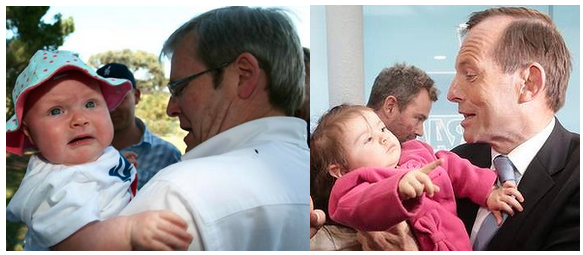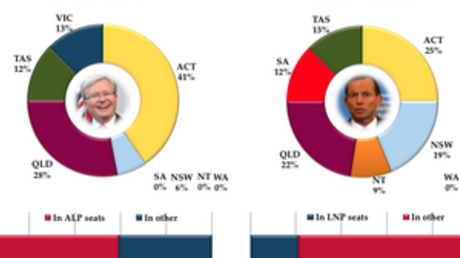POLITICS HAS been described as a contact sport that is played in slow motion.
But during an election campaign the tempo speeds up and the events of a week can be the equivalent of a month in ordinary time.
So for all those political tragics: here are the key dates for events in the 2013 campaign. They have been split into 'known knowns' and 'known unknowns'.

The "known knowns"
| Sunday August 4, 2013 |
|
Election Announced |
| Monday 5 August 2013 |
|
Dissolution of Parliament |
The last day before the caretaker period begins can be a frantic one for the government, ministers and their offices as outstanding items of government business are finalised ahead of the restrictions of the caretaker period taking effect.
The caretaker period commences when the House of Representatives is dissolved through the issue of the writs. This continues until the election result is clear or, if there is a change of government, until the new Government is appointed.
During the caretaker period, the business of government continues and ordinary matters of administration are still addressed. However, the Government avoids:
- Making major policy decisions that could commit an incoming government;
- Making significant appointments, and;
- Entering into major contracts or undertakings.
During the caretaker period, material prepared by agencies should not presume that any particular political party or parties will form the next government. Reference to post-election action should use the term 'incoming government'.
| Monday 12 August 2013, 8pm |
| Close of the Electoral Rolls |
The electoral roll contains a list of eligible voters for the election. Rolls closed at 8pm, seven days after the issue of writ. (Commonwealth Electoral Act s.155).
For the first time, in the 2013 election voters can enrol online.
| Tuesday 13 August 2013 |
| Release of Pre-Election Economic and Fiscal Outlook |
The Charter of Budget Honesty Act 1998 provides for the Secretaries to the Treasury and the Department of Finance and Deregulation to publicly release a Pre-Election Economic and Fiscal Outlook report (PEFO) within ten days of the issue of the writ for a general election.
You can read the 2013 PEFO here.
| Thursday 15 August 2013, midday |
| Close of Candidate Nominations |
The concept of proposing or nominating candidates is an important process. Electoral candidates cannot simply self-nominate. To act as a vouch, they have to be nominated by either a registered party or by the signature of 50 electors. Would-be candidates can easily stumble if nominators are not enrolled.
The closing date for nominations is at 12 noon between 10 days and 27 days from the issue of writs (Commonwealth Electoral Act s. 156).
The rules around nomination timelines are strict. Accordingly, the Australian Electoral Commission always urges candidates to get their paperwork in early so any errors can be amended ahead of the 11.59am cut off.
| Friday 16 August 2013, midday |
| Declaration of Candidate Nominations |
Nominations are publicly declared 24 hours after nominations close. This is then followed by a draw for positions on the ballot paper (Commonwealth Electoral Act s.176).
Generally, candidates hope to get as high on the ballot as possible to take advantage of the “Donkey Vote”, where people number their voting preference from the top of the ballot to the bottom regardless of the candidates.
| Saturday 17 August 2013, midday |
| Lodgement of Senate Group Voting Tickets |
Group Voting Tickets (GVT) must be lodged 48 hours after nominations close (Commonwealth Electoral Act s.211).
| Weekend of 17 and 18 August |
| The Big Print |
The Australian Electoral Commission commences printing ballot papers.
| Approximately Monday, 19 August |
| Distribution of Postal Vote Ballot Papers Commences |
The Australian Electoral Commission will send ballot papers as soon as possible after candidate nominations and Senate Group Voting Tickets close. This is likely to commence on 19 August.
Postal voting has increased at recent elections with nearly one million voters casting their vote in this way at the 2010 election.
| Tuesday, 20 August |
| Early Voting Through Pre-Poll Commences |
Early voting through pre-poll will be available from Tuesday 20 August 2013. This will allow registered voters to vote in person at an early voting centre or any Australian Electoral Commission divisional office in the weeks leading up to the election.
The number of people voting early has increased at recent elections with almost 20% of votes now being cast early through pre-poll or postal voting.
| Sunday, 25 August |
| Liberal Party launch |
The term “campaign launch” has become something of a misnomer. In the 2010 election the Coalition held its ''launch'' only 13 days from polling day while the Labor Party gave voters even less time to reflect, just five days.
| Monday, 26 August |
| Voting Commences for Australians Living Overseas |
Australians living or visiting overseas, who are enrolled, will be able to vote in the 2013 federal election by either applying online for ballot papers to be sent to their overseas address (postal vote), or by voting in person at any Australian diplomatic mission or consulate from 26 August 2013.
At the 2010 federal election, 72,306 votes were issued at overseas posts, including 16,041 in London and 7,797 in Hong Kong (source).
| Friday, 30 August |
| Last Day for Submitting Costing Requests to the Treasury and the Department of Finance and Deregulation. |
The Policy Costing Guidelines in the Charter of Budget Honesty stipulate that costing requests should be submitted on the sixth business day prior to polling day for the election (to allow five working days for the costing to be completed and allow public release on the Thursday before polling day).
Should requests be received later than the specified time, the Secretaries of Treasury and Finance will endeavour to cost the policy and release the costing. However it may not be possible to complete the costing in time for release on the Thursday before polling day for the election.
| Sunday, 1 September |
| Labor Party Campaign launch |
The term “campaign launch” has become something of a misnomer. In the 2010 election the Coalition held its ''launch'' only 13 days from polling day while the Labor Party gave voters even less time to reflect, just five days.
| Wednesday, 3 September |
| Ban on Broadcast of Advertisements. |
The Broadcasting Services Act 1922 bans the broadcast of political advertisements in the three days before an election. Online and print ads can continue to run.
| Thursday, 5 September |
| Last Day for Postal Vote Applications to be Submitted |
Postal vote applications can be submitted up until Thursday 5th September 2013.
| Thursday, 5 September |
| Last day to release Costings of Election Promises by the Parties. |
The Charter of Budget Honesty process has become an important feature of recent federal elections.
With the tendency for the parties to submit their policy proposals for costing late in the election this day has typically become one in which a large volume of costing reports are released and the fiscal position of the parties is finally revealed.
| Saturday, 7 September 2013 |
| Election Day |
Polling day is fixed between 23 and 31 days after the date of nominations. It must be a Saturday and at least 33 days after the issue of the writs. (Commonwealth Electoral Act s.157)
In the 2013 election the writ stipulates polling day will be on the 7th September.
Polling day is the day in which the majority of voters cast their vote. In 2010, approximately 10.5 million eligible citizens turn up to vote on polling day.
| Wednesday, 13 November 2013 |
| Last Day for the Return of the Writ. |
Writs must be returned within 100 days of their issue (Commonwealth Electoral Act s.159).
After the Senate polls are declared, the Australian Electoral Officer for each State and Territory returns the writ endorsed with the names of the successful candidates to the State Governor (or Governor-General in the case of the Territories). For the House of Representatives, the Electoral Commissioner endorses on a certificate attached to the relevant writ the name of each candidate elected for each division and returns the writs to the Governor-General.
The return of the writ by the Electoral Commission is the formal notification to the Crown of the election to parliament of the name or names endorsed on the writ. Of course, those names will already have been made public in the media and at the formal declaration of polling in each electorate. The return of the writ is the date from which the limited time to challenge the result runs.
| Friday, 13 December 2013 |
| Deadline for First Meeting of the 44th Parliament |
The new Parliament must meet within 30 days of the day appointed as the return of the writs (Constitution s.5).
The "known unknowns"
| Unknown date |
| The debates |
Kevin Rudd and Labor have proposed four debates to be held on each Sunday (the first leaders' debate was held Sunday the 11th of August, the seond will be on Wednesday the 21st August in Brisbane).
The Coalition have proposed three debates: one in the Australian Capital Territory this Sunday, one at Rooty Hill in western Sydney and one in Brisbane.
Email us if we have missed anything.




